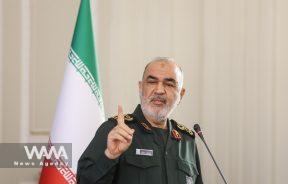Enemy Action Will Push Iran’s Nuclear Industry into a New Phase
WANA (Apr 02) – If threats against Iran’s nuclear program materialize, Iran will reconsider its defense doctrine and the nature of its nuclear program. The meaning of this reconsideration is very clear. While hostile actions by the Americans and Zionists may inflict damages on Iran and its people, two key consequences will follow: First, the enemy will suffer even heavier losses through a decisive retaliatory strike. Second, none of the declared objectives of military aggression—such as the destruction of Iran’s nuclear industry—will be achieved. On the contrary, this hostile move will push Iran’s nuclear industry into a new phase, requiring a new definition of Iran and the Axis of Resistance in regional and international equations.
Brigadier General Yadollah Javani, the political deputy of the Islamic Revolutionary Guard Corps (IRGC), wrote in an article for an Iranian news agency:
Threats of hostile actions and military strikes against Iran’s nuclear facilities and other vital centers have been frequently repeated by American and Zionist officials. Recently, media reports indicated that former U.S. President Donald Trump declared, “If we do not reach an agreement with the Iranians, we will attack them!” Similarly, Israeli Prime Minister Benjamin Netanyahu’s statement gained significant attention: “Even if God stands with them [the Iranians], we will defeat them!”
Whether these threats will ultimately be carried out remains uncertain and is still a matter of speculation. However, in response to this possibility, three definitive realities must be considered by both friends and foes of the Iranian nation:
First Point: The Enemy Cannot Eradicate Iran’s Nuclear Capabilities
The Americans and Zionists have repeatedly stated that the goal of a military attack on Iran is to destroy its nuclear facilities. However, they are absolutely incapable of eliminating Iran’s indigenous nuclear knowledge and technology through military action. Numerous reasons support this conclusion, but a statement from former U.S. President Barack Obama is sufficient to illustrate this point.
After the 2015 nuclear agreement (JCPOA), Obama faced strong criticism from American war hawks, who believed he had made a mistake by negotiating with Iran instead of preventing its nuclear progress. They insisted that Iran should never be allowed to have access to the full nuclear fuel cycle. In response, Obama openly stated, “If it were possible, I would personally dismantle every single bolt and screw of Iran’s nuclear facilities.” However, he admitted two critical points: first, that war with Iran was not in America’s interest, and second, that Iran’s nuclear industry could not be dismantled through military means.
Second Point: Iran Will Deliver a Powerful Retaliatory Strike
The Islamic Republic has repeatedly stated that it will never initiate a war. However, it takes national security and the interests of the Iranian people very seriously, as demonstrated over the past 46 years.
During his Eid al-Fitr sermon, the Supreme Leader of the Islamic Revolution once again addressed enemy threats. While dismissing the likelihood of these threats being carried out, he firmly warned: “If any hostile action is taken, a decisive retaliatory blow will be delivered.”
Thus, not only will the objectives of military aggression—such as the destruction of Iran’s nuclear industry—fail to be achieved, but such an attack will also propel Iran’s nuclear program into a new phase, necessitating a reevaluation of Iran’s role and that of the Axis of Resistance in regional and global dynamics.
The nature, consequences, and repercussions of Iran’s retaliatory strike will undoubtedly create a new chapter in regional and global developments. This is because Iran possesses three key strengths that ensure a decisive and effective response: political will, military power and capabilities, and its geostrategic position.
Third Point: A Potential Shift in Iran’s Nuclear Doctrine
The Islamic Republic has consistently emphasized that nuclear weapons have no place in Iran’s defense doctrine. The Supreme Leader’s religious decree (fatwa) prohibiting nuclear weapons has been repeatedly affirmed. Based on this ruling, Iran has never pursued nuclear weapons and has always defined its nuclear program as strictly peaceful and civilian-oriented.
However, a crucial point must be noted: Some Iranian officials have stated that if threats against Iran’s nuclear program become a reality, the country will reconsider its defense doctrine and the nature of its nuclear program. The implications of such a shift are crystal clear.
Therefore, while American and Zionist hostilities may cause damage to Iran and its people, two undeniable consequences will follow. First, the enemy will suffer even greater losses due to Iran’s decisive counterstrike. Second, rather than achieving their goal of dismantling Iran’s nuclear industry, their aggression will only push it into a new, more advanced phase—one that will redefine Iran’s position and that of the Axis of Resistance in regional and international affairs.












